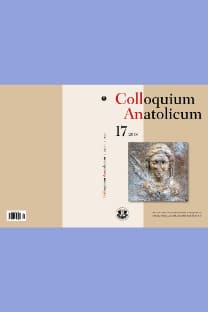Salasu Ritüeli'nin Hurrice ve Hititçe Versiyonları
Bu makale Hattu?a-Boğazköy'de ele geçen çift dilli bir metin olan ?ala?u Ritüeli'nin Hurrice ve Hititçe versiyonlarını içermektedir. KBo 19.145 ritüelin sekizinci tabletidir. Bu ritüel Kizzuwatnalı MUNUS?U.GI ?ala?u tarafından büyüye karşı icra edilmiştir. Hurrice ve Hititçe pasajlar arasında bazı farklılıklar görülmektedir. Bunlardan bazıları şöyledir: Hurrice versiyonunda Ay. IV 41'-42' ka??ap(i)=a=dil arar?=[ni a?t(i)=a] (42) fir=vir=i?t=i=b "Kapıda [kadını] büyü[den] serbest bıraktık", Hititçe versiyonunda Ay. III 41'-42' ??ki=kán alwanza??andan MUNUS-an (42) l?nun "kapıda büyü yapılmış kadını serbest bıraktım". Hurrice pasajda -dil birinci çoğul şahıs zamiri kullanılırken Hititçe lanun fiili birinci tekil şahıs formda çekimlenmiştir. Bu pasajda dikkate değer bir diğer nokta; Hurrice fir=vir=i?t=i=b fiili Hititçeye geçmiş zaman olarak tercüme edilmiştir -bilindiği gibi Eski Hurrice'de zaman belirten ek yoktur-, aynı cümle (Ay .III 47'-49') Hititçeye emir kipinde tercüme edilmiştir: Ay. IV 47'-50' a?ki=kán anda (48')[alwanza?]?[anda]n MUNUS-an l?tten (49')[??ki=kán anda alwanza]??andan LÚ-an (50') ar?a [tarnatt]en. "Kapıda [büyü yapı]l[mış] kadını serbest bırakın! [Kapıda büyü yapıl]mış adamı serbest [bırak]ın!"
The present paper includes the Hurrian and the Hittite versions of the Salasu's ritual which is a Hurrian-Hittite bilingual text from Hattusa-Boğazköy. KBo 19.145 is eighth tablet of the ritual. This ritual was performed against bewitchment by MUNUSSU.GI Salasu from Kizzuwatna. Some differences are observed between the Hurrian and the Hittite passages. Some of them are as follows: In Hurrian version Rev. IV 41'-42' kassap(i)=a=dil arare=[ni ast(i)=a] (42)fir=- vir=ist=i=b "We released the [woman from] sorcery at the gate", the Hittite version is Rev. III 41'-42' aski=kán alwanzahhandan MUNUS-an (42)lanun "I released the bewitched woman at the gate". The Hittite verb lanun occurs in the first person sg. while we find -dil first person pl. pronomen in the Hurrian passage. Another remarkable point in this passage; the Hurrian verb fir=vir=ist=i=b was translated into the Hittite as past tense (lanun) -as is well known the Old Hurrian doesn't have temporal indicator- , the same phrases (Rev. III 47'-49') were translated into the Hittite as imperative: Rev. IV 47'-50' aski=kán anda (48')[alwanzah]h[anda]n MU- NUS-an latten (49')[aski=kán anda alwanza]hhandan LÚ-an (50')arha [tarnatt]en. "Release the [bewit]c[he]d woman at the gate [Relea]se the bewitched man at the gate ".
___
Campbell, D. R. M.2007a Mood and Modality in Hurrian, Chicago Üniversitesi (Doktora Tezi), Chicago.
2007b "The Old Hurrian verb", VI Congresso Internazionale di Ittitologia, Roma, 5-9 settembre 2005, Parte I (Studi Micenei ed Egeo-Anatolici 49): 75-92.
2008 "Split Ergativity in Hurrian", Zeitschrift für Assyriologie und verwandte Gebiete 98: 262-294.
Giorgieri, M.
1998 "Die erste Beschwörung der 8. Tafel des ?ala?u-Rituals" General Studies and Excavations at Nuzi 10/2 (Studies on the Civilization and Culture of Nuzi and the Hurrians 9): 71-86.
2000 "Schizzo Grammaticale della Lingua Hurrica", La Civiltà dei Hurriti (La Parola del Passato 55): 171-277.
2002 "Beiträge zu den hurritischen Texten aus Boğazköy", P. Taracha (ed.), Silva Anatolica, Anatolian Studies Presented to Macciej Popko on the Occasion of His 65th Birthday, 109-117. Girbal, C.
1992 "Das hurritische Antipassive" Studi Micenei ed Egeo-Anatolici 29: 171-182.
Güterbock, H. G. - H. Hoffner
1989 The Hittite Dictionary of the Oriental Institute of the University of Chicago (CHD L-N), Chicago.
Haas, V. - H. J. Thiel
1978 Die Beschwörungsrituale der Allaiturah(h)i und verwandte Texte (AOAT 31), Neukirchen. Haas, V. - I. Wegner
1988 Die Rituale der Beschwörerinnen SAL?U.GI. (Corpus der Hurritischen Sprachdenkmäler I/5/1), Roma.
Laroche, E.
1980 Glossaire de la langue hourrite, Paris.
de Martino, S. - M. Giorgieri
2008 Literatur zum Hurritischen Lexikon (LHL) - Band 1.A., Firenze.
Neu, E.
1995 "Miscellanea Hurritica", General Studies and Excavations at Nuzi 9/3 (Studies on the Civilization and Culture of Nuzi and the Hurrians 5): 45-52.
1996 Das hurritische Epos der Freilassung I (Untersuchungen zu einem hurritisch-hethitischen Textensemble aus ?attu?a (StBoT 32), Wiesbaden.
Richter, T.
2012 Bibliographisches Glossar des Hurritischen, Wiesbaden. Tischler, J.
2006 Hethitisches Etymologisches Glossar (HEG S/II), Innsbruck. Ünal, A.
2007 Multilinguales Handwörterbuch Des Hethitischen / A Concise Multiligual Hittite Dictionary / Hititçe Çok Dilli El Sözlüğü, Vol. II N-Z, Hamburg.
Wegner, I.
1988 "Grammatikalische und lexikalische Untersuchungen hurritischer Beschwörungsformeln aus Boğazköy" V. Haas (ed.), Hurriter und Hurritisch (Xenia 21): 145-155.
2001 "Haus und Hof im Hurritischen", T. Richter - D. Prechel - J. Klinger (eds.), Kulturgeschichten, Altorientalistische Studien für Volkert Haas zum 65. Geburtstag, 441-447.
2007 Hurritisch. Eine Einführung. 2., überarbeitete Auflage, Wiesbaden. Wilhelm, G.
1983 "der hurritische Ablativ-Instrumentalis /ne", Zeitschrift für Assyriologie und verwandte Gebiete, 73: 97-113.
2001 "Hurritisch naipti "Weidung", "Weide" oder eine bestimmte Art von Weide" T. Richter - D. Prechel - J. Klinger (eds.), Kulturgeschichten, Altorientalistische Studien für Volkert Haas zum 65. Geburtstag, 449-453.
2008 "Hurrian", R. D. Woodard (ed.) The Ancient Languages of Asia Minor 81-104. (Footnotes)
1 Diğer ihtimal ?u-ul-la-tar (Giorgieri 1998: 73).
2 48'-49'. satırlarda fir=vir= i?t=i=b fiili önceki satırlarda (41'-43') görüldüğü gibi geçmiş zamanda tercüme edilmiştir. Ancak geniş/gelecek zamanda da tercüme etmek mümkündür. 47'-49' K[apıda] (48)kadını büyüden serbest bırak[ırız/bırakacağız.] (49') kapıda [adamı] büyü[den serbest bırakırız/bırakacağız].
- ISSN: 1303-8486
- Yayın Aralığı: Yıllık
- Başlangıç: 2002
- Yayıncı: Türk Eskiçağ Bilimleri Enst.
